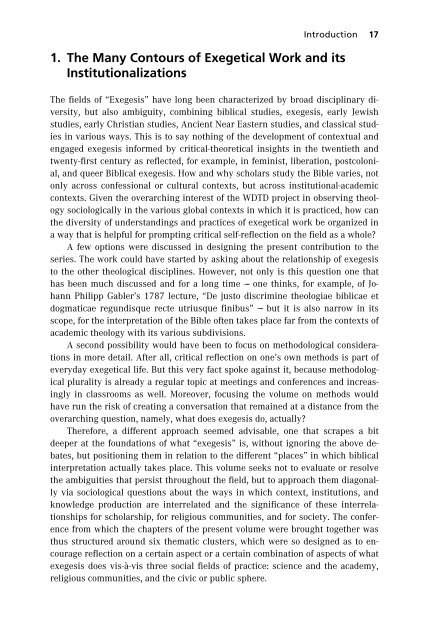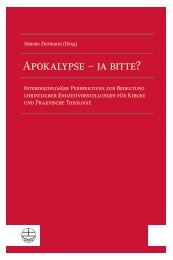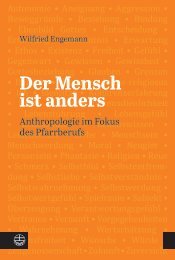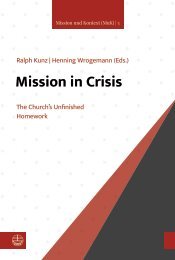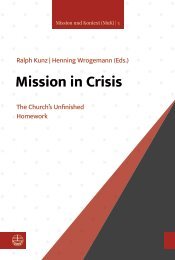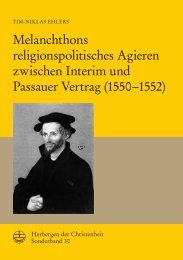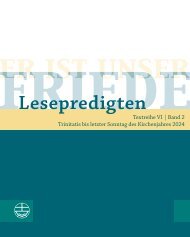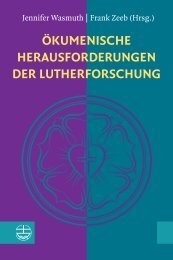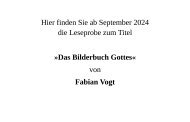Phillip A. Davis, Jr. | Daniel Lanzinger | Matthew Ryan Robinson (Eds.): What Does Theology Do, Actually? (Leseprobe)
You also want an ePaper? Increase the reach of your titles
YUMPU automatically turns print PDFs into web optimized ePapers that Google loves.
Introduction 17<br />
1. The Many Contours of Exegetical Work and its<br />
Institutionalizations<br />
The fields of ‘‘Exegesis’’ have long been characterized by broad disciplinary diversity,<br />
but also ambiguity, combining biblical studies, exegesis, early Jewish<br />
studies, early Christian studies, Ancient Near Eastern studies, and classical studies<br />
in various ways. This is to say nothing of the development of contextual and<br />
engaged exegesis informed by critical-theoretical insights in the twentieth and<br />
twenty-first century as reflected, for example, in feminist, liberation, postcolonial,<br />
and queer Biblical exegesis. How and why scholars study the Bible varies, not<br />
only across confessional or cultural contexts, but across institutional-academic<br />
contexts. Given the overarching interest of the WDTD project in observing theology<br />
sociologically in the various global contexts in which it is practiced, how can<br />
the diversity of understandings and practices of exegetical work be organized in<br />
a way that is helpful for prompting critical self-reflection on the field as a whole?<br />
A few options were discussed in designing the present contribution to the<br />
series. The work could have started by asking about the relationship of exegesis<br />
to the other theological disciplines. However, not only is this question one that<br />
has been much discussed and for a long time --- one thinks, for example, of Johann<br />
Philipp Gabler’s 1787 lecture, ‘‘De justo discrimine theologiae biblicae et<br />
dogmaticae regundisque recte utriusque finibus’’ --- but it is also narrow in its<br />
scope, for the interpretation of the Bible often takes place far from the contexts of<br />
academic theology with its various subdivisions.<br />
A second possibility would have been to focus on methodological considerations<br />
in more detail. After all, critical reflection on one’s own methods is part of<br />
everyday exegetical life. But this very fact spoke against it, because methodological<br />
plurality is already a regular topic at meetings and conferences and increasingly<br />
in classrooms as well. Moreover, focusing the volume on methods would<br />
have run the risk of creating a conversation that remained at a distance from the<br />
overarching question, namely, what does exegesis do, actually?<br />
Therefore, a different approach seemed advisable, one that scrapes a bit<br />
deeper at the foundations of what ‘‘exegesis’’ is, without ignoring the above debates,<br />
but positioning them in relation to the different ‘‘places’’ in which biblical<br />
interpretation actually takes place. This volume seeks not to evaluate or resolve<br />
the ambiguities that persist throughout the field, but to approach them diagonally<br />
via sociological questions about the ways in which context, institutions, and<br />
knowledge production are interrelated and the significance of these interrelationships<br />
for scholarship, for religious communities, and for society. The conference<br />
from which the chapters of the present volume were brought together was<br />
thus structured around six thematic clusters, which were so designed as to encourage<br />
reflection on a certain aspect or a certain combination of aspects of what<br />
exegesis does vis-à-vis three social fields of practice: science and the academy,<br />
religious communities, and the civic or public sphere.


